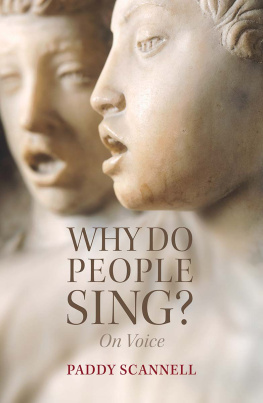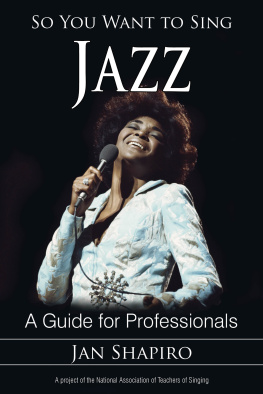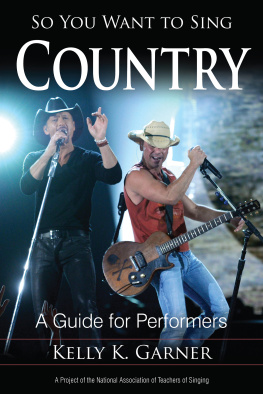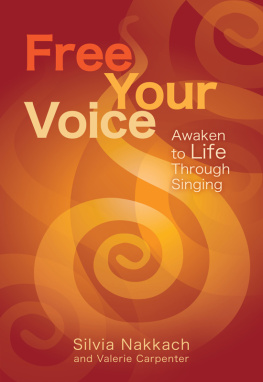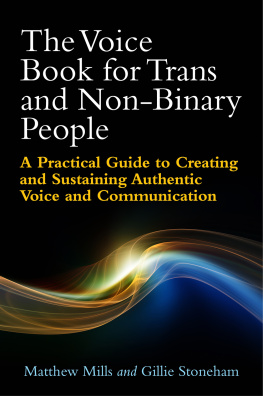
WHY DO PEOPLE SING?
On Voice
Paddy Scannell
polity
Copyright Paddy Scannell 2019
The right of Paddy Scannell to be identified as Author of this Work has been asserted in accordance with the UK Copyright, Designs and Patents Act 1988.
First published in 2019 by Polity Press
Polity Press
65 Bridge Street
Cambridge CB2 1UR, UK
Polity Press
101 Station Landing
Suite 300
Medford, MA 02155, USA
All rights reserved. Except for the quotation of short passages for the purpose of criticism and review, no part of this publication may be reproduced, stored in a retrieval system or transmitted, in any form or by any means, electronic, mechanical, photocopying, recording or otherwise, without the prior permission of the publisher.
ISBN-13: 978-1-5095-2945-2
A catalogue record for this book is available from the British Library.
Library of Congress Cataloging-in-Publication Data
Names: Scannell, Paddy, author.
Title: Why do people sing? : on voice / Paddy Scannell.
Description: Cambridge, UK ; Medford, MA : Polity Press, 2019. | Includes bibliographical references and index. |
Identifiers: LCCN 2018049240 (print) | LCCN 2018056143 (ebook) | ISBN 9781509529452 (Epub) | ISBN 9781509529421 (hardback) | ISBN 9781509529438 (pbk.)
Subjects: LCSH: Voice--Psychological aspects. | Oral communication. | Singing.
Classification: LCC BF592.V64 (ebook) | LCC BF592.V64 S33 2019 (print) | DDC 302.2/242--dc23
LC record available at https://lccn.loc.gov/2018049240
The publisher has used its best endeavours to ensure that the URLs for external websites referred to in this book are correct and active at the time of going to press. However, the publisher has no responsibility for the websites and can make no guarantee that a site will remain live or that the content is or will remain appropriate.
Every effort has been made to trace all copyright holders, but if any have been overlooked the publisher will be pleased to include any necessary credits in any subsequent reprint or edition.
For further information on Polity, visit our website: politybooks.com
Preface
In this short book, I have set myself the difficult task of writing about the human voice, with the eventual goal of answering the question in my title. Why do people sing? It is a personal book, based on my academic lifes work, but not written primarily for the academic community. It is also a book intended to appeal to a broader nonacademic readership. My starting point is my own historical work on British broadcast radio and the gradual recognition that it consisted wholly of people talking and singing at the microphone. Television is an extension of radio, not of cinema, and it too depends on talk for its effect.
From this I came, much later, to two things: first, that underpinning all talk is the largely invisible and very much neglected topic of voice. I have only recently come to the conclusion that talk is a thing in itself, and should not be thought of as spoken language or oral communication. Talk, as my first chapter attempts to show, depends on a native language. It would be odd to suppose that talk is nonlinguistic, but that is not all it is. I now think that talk (which I think of as first language) is primarily about communication and, as such, is the entry point into human society. This means that talk is primarily a sociable phenomenon, and as such is (humanly) universal. The sociability of talk was (for me) revealed through radio and then television. In todays noisy world there is much talk that is aggressive, egoistic, and confrontational, and this forced me to wonder whether this is the context in which we learn to talk.
It struck me as important that talk is learned intergenerationally: from one generation to the next. And it strikes me as equally important that this is a caring, reciprocal process, one on one, between adult and child, child and adult, and also if it is to work a multilayered process involving desire, love, and more besides, that all come together not just or only in language, but in looks and gestures, facework and close proximity between two people who jointly, and with gladness of countenance, share in this process. I simply could not imagine that talk began otherwise, as a form of aggression or human egotism.
These tentative thoughts led me to an even more tentative conclusion: that communication (talk) and language are nonidentical. It seemed obvious to me (eventually) that writing is the medium of language and its primary function has nothing to do with communication and talk. Writing is, I think, a system of record with primary economic and financial functions that have developed over many centuries. It is also (but accidentally) a primary historical resource in fact, our only one, until sound recordings were invented in the nineteenth century. The very new digital age that we live in depends entirely on language not the analog language of broadcasting, but the digital language of social media and the internet. This fact is hidden from us, largely because the binary digital numeric code of computers and much more are all reconverted into alphabetic, analog code with which we have long been familiar.
These, I think, are the wider, tentative implications of this little book. I start with the communicative musicality of the voices of parent and child as a baby learns to talk. I consider the beautiful sound medium of radio its impact on voice, talk, music, and singing, and its crucial role in making them public in quite new ways. Recording technologies developed for broadcasting put voice on record, making it a radically new historical resource for historians, hitherto almost wholly reliant on written archives. In written fiction, readers cannot hear the voices of the characters or of their author. Or can they? I explore the voices in the text, including the voice of the text in one of the Mapp and Lucia novels of E. F. Benson. Finally, I attempt the impossible task of putting into words on paper the inexpressible experience of listening to singing, wherein the glory of the human voice finds its purest expression.
In writing this book, I have drawn extensively on my own academic writings over the last forty or so years. Historical details on the early BBC may be found in the work I co-wrote with David Cardiff, A Social History of Broadcasting (1991). Further information on particular programs may be found in later work. Detailed accounts of Harry Hopeful and The Brains Trust may be found in my Radio, Television and Modern Life (1996) and Television and the Meaning of Live (2014), respectively.
For information on unreferenced talk and language, I have used the invaluable Wiki extensively, and likewise for the historical context of singing, along with the equally invaluable multivolume Groves History of Music.
I have tried to think of similar academic writing on talk, but none comes to mind.
As a background to everything about communication and language in this book, I would recommend Chapters 6 and 7 in my Media and Communication (2007).
Well-known works, for instance Roland Barthes on photography or Jacques Derridas On Grammatology, are acknowledged, but not referenced. Some familiarity with the writings of Heidegger and Wittgenstein is assumed.
The Tronick experiment, analyzed in some detail in , can easily be found on YouTube.
The Voice of the Friend
My topic, voice, is one that has puzzled me for a long time. Perhaps the best way to explain this is to outline how I (eventually) discovered it and how it came to interest me. I came upon it by chance or, more exactly, as a byproduct of the focal topic of my academic working life, which was, and remains, radio. Back in the 1970s, David Cardiff and I began working on a history of the beginnings of broadcasting in Great Britain. It turned into a study of the British Broadcasting Corporation from its beginning in late 1922 through to the outbreak of war in 1939. We were interested in how people working in the BBC figured out, starting from scratch, how to do what in fact they did i.e., make programs (as they came to be called) that people might want to listen to. To
Next page
